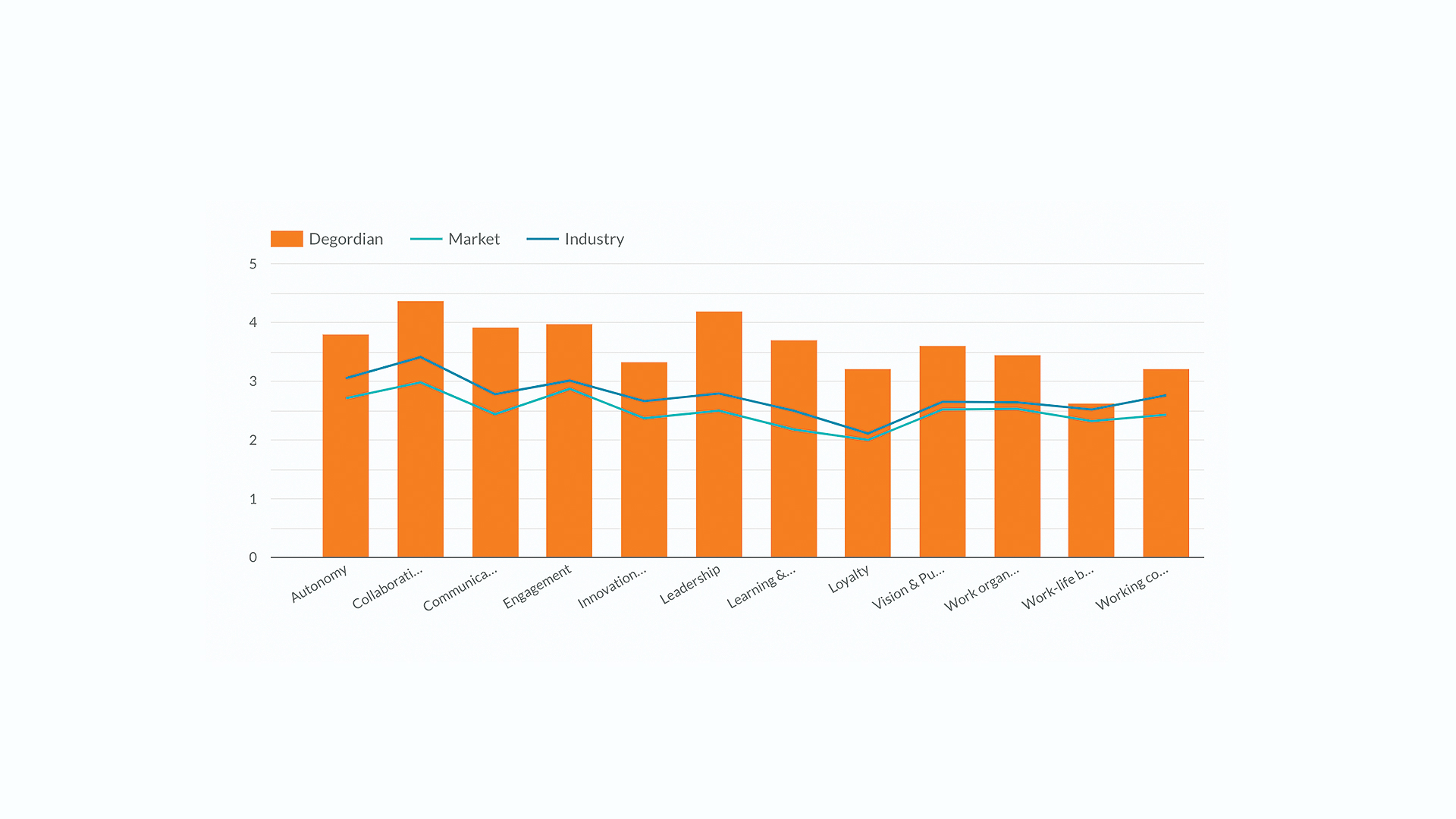Work-life balance is a theme that has been discussed a lot in the last few years. In spite of that, many people are still struggling with finding and keeping that balance.
It can be very hard to have a good work performance, be satisfied and fulfilled with your job, and dedicate enough time to other aspects of your life – parenthood, keeping a healthy lifestyle, meeting up and really being present with your family and friends, hobbies, doing chores, having some time to yourself…(or whatever you want to do in your free time). A person can easily feel like a machine trying to achieve so much. Let’s say it loud and clear: finding balance is not easy, but it is possible. But you might have to accept that maybe you can’t or don’t have to have it all.:)
When it comes to difficulties in finding balance, we have to admit that sometimes, employees in Degordian are no exception. We decided to tackle this theme once again because the results of our Stethoscope survey have shown that one of our weakest spots is work-life balance. We have to be realistic and admit that it seems that an agency will always be a dynamic place, with a lot of changes and rush – also known as agency life. And some people love this tempo and the rush. But, in the long run, we are a company that takes care of its employees and we want to work on every aspect that makes them less satisfied, including work-life balance. In this blog, we will talk about what everyone (not only Degordians) can do to balance their work-life balance (pun intended).
Let’s rip off the band aid and start with the negative impact that can appear in our work life, that is often related to (but not limited to) work-life balance: burnout.
What is burnout?
Burnout is a state of physical, emotional and mental exhaustion caused by long-term stress in the workplace. People experiencing burnout might feel tired all the time and feel overwhelmed. The demands of the workplace are becoming harder to meet, and their views on life and job can change, becoming more negative. Even though burnout is a syndrome related to job and workplace, its effects are strong and go way beyond just a job – it can impact a person’s whole life. Besides constant tiredness and feeling overwhelmed, people who are in burnout, also feel drained, demotivated, and have a negative view on the job. They might have difficulties in productivity and finding focus, being less efficient and unable to finish the job.
Burnout also leads to increased irritability, frustration, mood swings, and sometimes, anxiety and depression, while physical symptoms can include headaches, sleep disturbances etc. Since a person is exhausted and unmotivated, they can distance themselves from the job and start investing just the minimal effort as the form of self-preservation. This is the opposite behavior in comparison with before – when a person was trying to do the best possible job. The environment can notice that change since the quality of the job can be violated. All of these symptoms can be summarized into three key components of burnout: (1) overwhelming exhaustion, (2) feelings of cynicism and detachment from work and (3) a sense of ineffectiveness and lack of accomplishment.
Another important thing to emphasize is that although burnout might seem like an individual’s problem, it is also an important company’s problem. It can lead to lower job quality, job dissatisfaction, increased number of sick days, lower loyalty, and of course, higher turnover. Besides that, it can negatively affect interpersonal relationships between employees. Of course, the situation is even harder if more than one person is experiencing burnout. A type of corporate culture we can mention here is hustle culture. This term refers to the mindset that encourages constant work, long hours, and sacrificing your private life and well-being, only to achieve business success and goals. Although this mindset is starting to shift, some companies are still embracing it, leaving employees who don’t follow this culture feeling less culturally fit.
In the culture context, we can also look at the bigger picture than corporate culture. Social norms in the culture we live in also tend to create pressure to have it all in personal and professional life, as can our surroundings or close ones. Every person should see for themselves what their priorities are and how other people’s expectations impact their mental health and relationships. These are some things to think about when we are talking about burnout, since they can also impact our stress levels and resilience.
Since burnout is caused by a long-term exposure to stress, there are a few stages that we can differ in the development of burnout. Psychologist Herbert Freudenberger has identified twelve stages of burnout, which we will shortly discuss.
- Burnout starts with excessive ambition or a very high need of the individual to prove themselves. A person can work hard and work long hours to prove their worth and it can seem harmless, like the person is just very enthusiastic about their job.
- In the second phase, a person works even harder and can even start neglecting other aspects of their life, focusing on the work only. They find it very hard to distance themselves from the job and work overtime.
- Neglecting personal needs — besides other aspects of life, in this stage, a person starts neglecting personal needs, like getting enough sleep, eating regularly etc.
- Displacement of conflict — in this stage, a person is aware that something is happening and that this way of working is not good – but instead of focusing on finding a solution for that problem, a person can blame job demands, their boss or colleagues for their situation.
- Revision of values —that can happen in the fifth stage of burnout means that a person’s value system can change – in the sense that they give much more value to their job than personal values or relationships, which can lead to the feelings of emptiness. A person can also start viewing their own value through work-related success and goal accomplishment.
- Denial — even though the person has the feeling that something isn’t right, they often undermine or deny the fact that they are experiencing burnout. Instead, they blame others, ignore signs of physical and psychological exhaustion or assure themselves that this is just a temporary stress.
- Social withdrawal — a person starts to withdraw themselves from other people, friends and family. Social activities they once enjoyed can become a burden.
- Changes in behavior — a person becomes more irritable, impatient, and can get angry easily. Other people notice these changes as they can affect them negatively.
- Depersonalization — a person feels detached from their own life, they feel like they lack control over their life and may develop cynical and negative attitudes toward others and work.
- Feelings of inner emptiness — a person may feel anxious, empty, or despair. It is possible that they turn to unhealthy coping mechanisms such as drinking, excessive eating, gambling etc.
- Depression — feeling sad, emotionally exhausted and hopeless, questioning the meaning of work and life in general.
- Even though previously mentioned phases don’t have the same duration, intensity or order for every person, the final stage is experiencing burnout syndrome. We have already explained the symptoms of full burnout syndrome, and in short, in this stage a person feels overwhelmed, exhausted, detached from work and ineffective.
- This being said, burnout syndrome is a complex syndrome consisting of many stages and mixed emotional, mental and physical symptoms. Sometimes people don’t recognise it and are not aware that they need to change something in order to feel better. We hope that this short description of burnout might help someone to recognise that they are going through it. But more importantly, let’s talk about how to prevent and how to overcome burnout!
Burnout happened. Now what?
If you experienced burnout and realized that you have to change something, you might take the turn to “it’s my fault”, “how have I let this happen” or a similar alley. Now, we know that this is easier said than done, but don’t. You’re just a human, like anyone else, and burnout, just like any other physical or psychological states can happen to many people. Blaming yourself is not a constructive way on your recovery path. It is good to analyze the situation and think about where things went wrong, but only to use it as lessions for taking different paths in the future, not to ruminate and torture ourselves because of that. Healing from burnout takes time, dedication and being self-compassionate. It is an individual process in terms of time and the methods that work, and you might benefit from professional help.
- Recognizing and acknowledging that we are in a burnout is a first step towards feeling better. Take time to think about symptoms of burnout you had, and maybe talk about what you experienced with a mental health expert.
- Seek help and support — apart from a therapist, as said above, turn to your loved ones for support and talk openly about how you feel. Try (re)connecting with friends, family and close co-workers.
- Think about reasons that led to your burnout. Again, not to ruminate over them, but to prevent the same thing happening in future. Analyze what were the factors of the job, your personal traits, your environmental factors and other factors that led to this.
- When you have identified the above mentioned factors, think about which of them you have to change, which are good for you and which you might have to change in the future. In this step and analysis, a mental health professional can help you look at the situation from different and objective views, and help you view options for the next steps.
- Take significant steps to change your work environment. Think about what could help you, and talk with your superior about your needs and limitations.
- Learn and adopt new or different coping strategies — work on developing or strengthening your healthy coping mechanisms. Learn about stress management methods, assertiveness and setting boundaries. This is a step in which you can also benefit from a mental health expert’s help.
- Take good care of yourself — starting with basic needs – sleep enough, eat balanced meals, stay in contact with nature, take time for yourself, engage in social and physical activities.
Preventing burnout — finding balance
Now, let’s talk about some steps that most people (considering that the majority of people are not experiencing burnout) can do to achieve or maintain a long-term, healthy work-life balance.
We also have to emphasize that the meaning of work-life balance is not the same for everyone. This is something very individual and everyone has to find for themselves the certain amount of time they want and can dedicate to work and a certain amount of time for the life part. There is no perfect formula, but you can sum it up like this: whatever makes you happy and keeps you away from burnout, while you still meet all the work deadlines! 🙂
However, if reading this made you think that you would be the happiest and have the best balance when working two hours, and having the rest twenty-two for yourself, don’t quit your job just yet. I’m not saying it’s not possible, but most people still work 40-hour work weeks. So, here are a few tips on keeping the work-life balance in this tempo.
- Setting boundaries. Let’s start with the hard one. This might be a process, but it is recommended to set clear boundaries on work, clearly define your schedule and communicate it to your colleagues. This will help you separate private and work life and make it easier for you to separate from work – after work.
- Use flexibility in the best possible way – many employers today are very flexible and allow you to organize your time the way you want. For example, if you like working out in the morning, or having a long coffee in peace before work, simply start working later in the day. If you are an early bird that likes to focus in the morning, start early and use the afternoon for your hobbies. In short, tailor the work according to yourself. Here in Degordian, we have the huge flexibility and trust, and we hope that the other companies will see the benefits of that approach as well. Read more about our benefits here.
- Set priorities. Think about what your true values and priorities in life are. What really matters to you in the long run? Think like this and it might become more clear where you want to invest your time.
- Setting priorities also applies to your work — set clear priorities for the day, week and month and stay focused on the tasks that matter most. You can delegate other tasks or complete them when the important ones are done.
- Organize your time. Time management is a very important skill for today, and of course, it can be learned. Planning your week and day in advance will help you increase efficiency and reduce stress. Be realistic while planning, and keep in mind all the important parts of work and personal life you want to include.
- Take the time for friends, family and yourself — don’t forget to dedicate time for your loved ones and the ones you are the closest with. Invest in meaningful relationships, and also take time for yourself and things you enjoy – hobbies etc.
- Take care of your health. As mentioned before, it is essential that you eat and sleep regularly, exercise, and relax.
- In your free time (after work) and on vacation, try to really unplug and live in the moment, really being there for the activities you enjoy. Quality time will help you unwind, relax and charge your batteries.
- No screen time — a lot of our time goes to online communication or scrolling our phone. A lot of people also work on their computers all day long, so taking some time without technology and focusing on the “real world” can help you detach from work.
In conclusion, we have to be aware that our mental health is our own responsibility. We are aware that this is sometimes easier said than done and that external factors (like your boss or amount of work) play a significant role in handling work-related stress. If you are facing burnout, we recommend you contact a mental health expert. The information in this text is not intended as mental health advice and it is purely of informative nature, but we hope this tips will be useful to help you maintain a healthy work-life balance! 🙂



